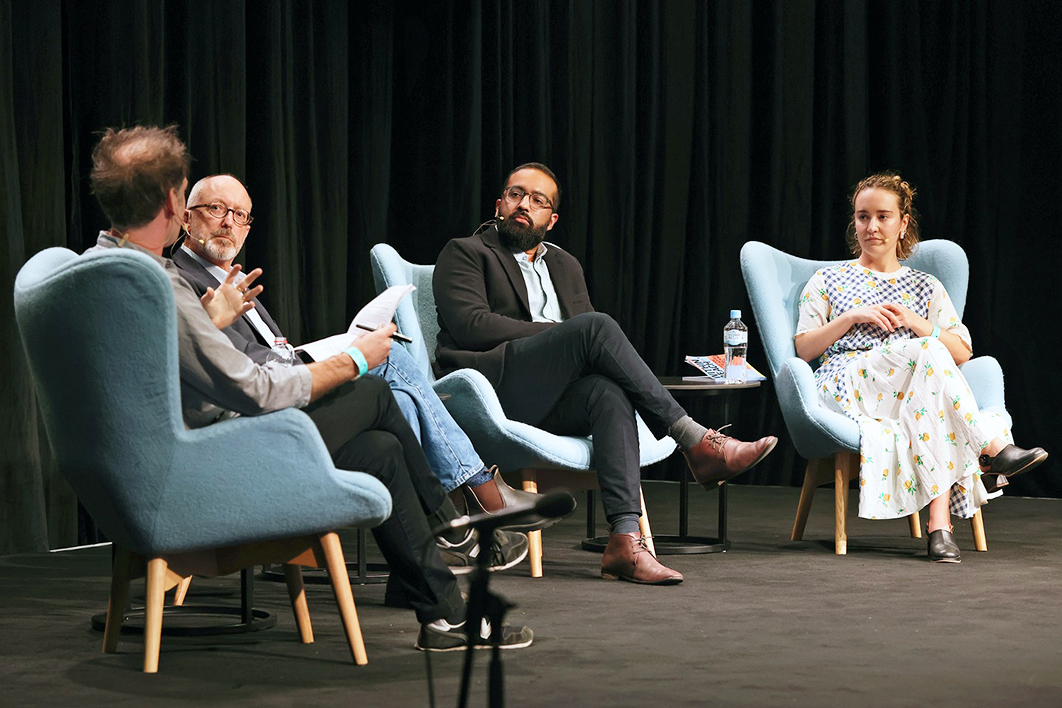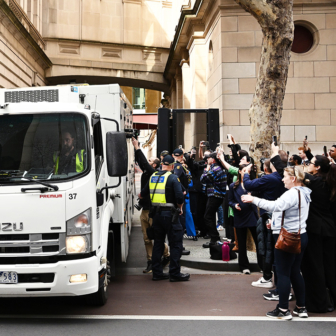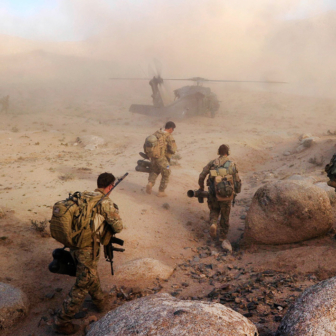The goldfish bowl of journalism has had some kicks. The water is in turmoil and for the moment, at least, we journalists can glimpse the medium in which we swim.
Female journalists in Canberra are reporting on matters previously seen as private. They have been accused of advocacy — of abandoning the journalistic creed of objectivity. Twitter and Facebook exercise more power than any editor over what can be said, who can say it and the tone of public life.
The accepted practices of mainstream journalism are under profound challenge. Are the established disciplines and notions of objectivity our anchor in a world of lies? Or are they stale, white bulwarks of prejudice and inequality?
Consider the following story told by Osman Faruqi, editor of Schwartz Media’s daily news podcast 7am, at the Sydney Writers’ Festival earlier this month. After the Christchurch mosque shootings in August 2019, Faruqi said, he told different news organisations they were missing an opportunity by not having a Muslim journalist on the ground in New Zealand.
“You’re going to get a more empathetic and deeper story if people can speak in the language to the survivors,” he said, “and if they’ve been in a mosque before.” It would be wrong to send a Muslim journalist, one senior editor responded, because they would have too much “skin in the game.”
“I found that a very fascinating and revealing comment,” said Faruqi, “because it assumes that neutrality is the point of view of a middle-class white man, and everyone else is biased. My response was, ‘This is a white supremacist attack. You’re a white person who benefits from the structures and powers of white supremacy. You have skin in the game and so does every other white journalist reporting.’”
The session, sponsored by the Judith Neilson Institute and chaired by Schwartz Media’s editor-in-chief Erik Jensen, was set up as a contest between new sensibilities, represented by journalists like Faruqi, and the traditionalist defenders of objective reporting, represented by Alan Sunderland, who as the ABC’s former editorial director was responsible for setting journalistic tone and practice at the national broadcaster.
The two men were joined by former journalist Ariel Bogle, who researches online influence and disinformation campaigns for the Australian Strategic Policy Institute.
Perhaps surprisingly, none of the panellists suggested that the journalistic ideal of objective reporting should be abandoned. As Bogle said, it was not really under attack. Where they disagreed, it was about the implications of the dawning realisation that journalism has blind spots. Those blind spots include previously unquestioned assumptions about which voices are “credible” and which should be ignored.
It is important to define the term “objectivity,” Sunderland argued, and recognise that it doesn’t necessarily mean balance. It resides not in the individual journalist or in the newsroom but in the professional discipline and judgement exercised by journalists and their managers. It means reporting in line with the evidence.
Good, objective reporters won’t give equal time and space to climate change deniers and climate change scientists, said Sunderland, and then regard their job as done. Rather, they will question their own preconceptions and do their best to set them aside, then gather the facts and exercise judgement. They will be led by the evidence.
In Sunderland’s words, this approach to objectivity is “fundamentally important and can work.” He sees his role as defending that idea against the legacy of “fairly sloppy practice and some fairly large blind spots.” So-called impartiality — or “balance” — is “at risk of imposing a very conservative, very predictable worldview, even as it’s pretending and claiming not to.”
The panellists agreed that sexism and sexual assault in Canberra would probably not have been recognised as a legitimate news story a few decades ago, when the gallery was male-dominated. Now, largely thanks to more senior female journalists, the paradigm had shifted. It wasn’t mentioned during the session, but the ABC’s 7.30 anchor, Leigh Sales, has said that she is reconsidering her “unspoken rule” that politicians’ private lives are out of bounds. “Have I been educated in, and almost brainwashed into, a system that has protected powerful men at the expense of women?”
Sunderland said that the ABC decided during his time in the job not to amplify those who disputed the established facts on climate change. But as for the debate about how to respond to those facts — how fast the world should move to zero emissions, the means of doing that, whether gas has a role in the transition — it was the job of the public broadcaster to reflect all views.
Most people would probably agree with that approach — yet the same principle can lead to dark places. During the marriage equality plebiscite, Sunderland said, there had been a “largely generational” internal debate between those who thought only one legitimate view existed — a Yes vote on human rights grounds — and those, like him, who thought all views should be presented.
“You don’t have to take the side of a particular fundamental religious perspective,” he said. “But there are legitimate views that need to be dealt with as objectively as possible and presented back into the community.”
But what, responded Faruqi, if it had been not marriage equality but interracial marriage, or a plebiscite about discrimination against Muslims? Would the national broadcaster still see its role as being to amplify all sides, including “ideas that are fundamentally heinous”?
Sunderland acknowledged that the ideal newsroom should be “as diverse as possible — socioeconomically, ethnically, gender, all of those things.” This was not so much to overturn the notion of objectivity, as to make it stronger. “I then want those in the newsroom to rub up against each other, to eliminate each other’s blind spots and to produce the kind of classic impartiality that I think powers the best [that journalism] can do.”
Faruqi responded that white male journalists didn’t just wake up one day and decide to let women and people of colour into the magic circle. “People like myself and from other marginalised groups have kicked down the doors to be let in, and there’s still nowhere near enough of us.”
If newsrooms reflected the diversity of the nation, said Faruqi, they would make different judgements about how to report matters of race. “When it comes to reporting things like sexual assault or racism, I’m very happy to be on the side that says it’s bad when powerful people do bad things to less powerful people. And my reporting is going to take that perspective.”
But reflecting the nation doesn’t necessarily mean revealing some progressive nirvana. As Sunderland pointed out, opinion polls suggest most Australians are in favour of capital punishment. It isn’t a “live, active debate at the moment,” but if it ever were, “the ABC and responsible media” would need to find a way of teasing out the arguments as fairly as possible. “We should not say the ABC has decided that we have a particular view and we’re going to use that to filter what we report.”
Bogle expressed frustration at old-fashioned news reporters and editors who had a “naivety and lack of internet fluency” about how content was used online. Mainstream media not only ignores social media, she argued, but exercises a wilful ignorance — “a kind of snobbery” — and refuses to take any responsibility about how their work can “flow through to those forums.”
A critical article about the rise of neo-Nazi groups might be used by the very same groups to promote their cause, for example. Or a headline about vaccine side effects would be used by anti-vaxxers, shorn of its context. Journalists need to recognise that they aren’t the only ones speaking, she said; otherwise their approach is arrogant and dangerous.
Bogle implied that social media requires journalists to be more prepared to make explicit judgements. The Trump era led American journalists to reconsider what objectivity meant. CNN, for example, had started to call out Trump’s lies. “I am curious about whether Australian newsrooms would ever feel confident enough to make that kind of call.”
So what can we take away from this “war in newsrooms” — albeit a conflict that was conducted courteously, on stage, at a literary festival?
Journalism has two traditional roles. The first, articulated in the journalists’ code of ethics, is to “describe society to itself.” At first glance, that might imply a passive role — merely recording what is going on.
The other is to hold power to account, including — as Faruqi argued — by interrogating the often-accepted, often-invisible assumptions about who should be heard, and what constitutes legitimate authority.
But where does advocacy in journalism begin and end? It is one thing to advocate for the victims of sexual assault, for example. It is one thing to report, as is the case, that the evidence suggests most complaints of sexual assault are true. But does that mean we should uncritically believe alleged victims — such as the woman who made allegations against Christian Porter, or the men who accused George Pell?
Even those who abhor both those men would surely see the risk if this became accepted practice — the risk of a dangerous slide of journalism into vendetta.
Is there a tension between the passive “describing” role of journalism, and the active holding to account? I think the debate about objectivity, properly understood, reveals that they are in fact the same. If we describe society to itself, that description will include a constant attempt to see more clearly, to understand the hidden.
For example, it will include reporting that domestic violence is one of Australia’s biggest social, economic, human rights and criminal problems, and that it is all-pervasive. It would include the shocking fact that women are most at risk of violence in their homes. Until very recently, though, domestic violence was regarded as mostly a private matter.
Describing society to itself would include acknowledging the realities of the founding of modern Australia, including the violence of invasion and its present-day legacy. Yet, until recently, we barely spoke of this.
Describing society to itself implies a constant effort to see the water in the goldfish bowl, to reveal the reality of our condition. And that objectivity implies performing the other journalistic role — the constant interrogation of power. The two roles are the same.
Journalism should be engaged in a constant effort to see better and report better. It is an art and a process, not a science or a destination.
I like to think of journalism as being like the art of drawing maps. We can choose what to map — population, waterways, streets or mountain ranges. But one principle is universal. Maps should be useful. If they leave out important features, or distort the lay of the land, they will not be useful and can be dangerous.
Journalists should strive to be good map-makers. Without that discipline, we will all be lost. •




